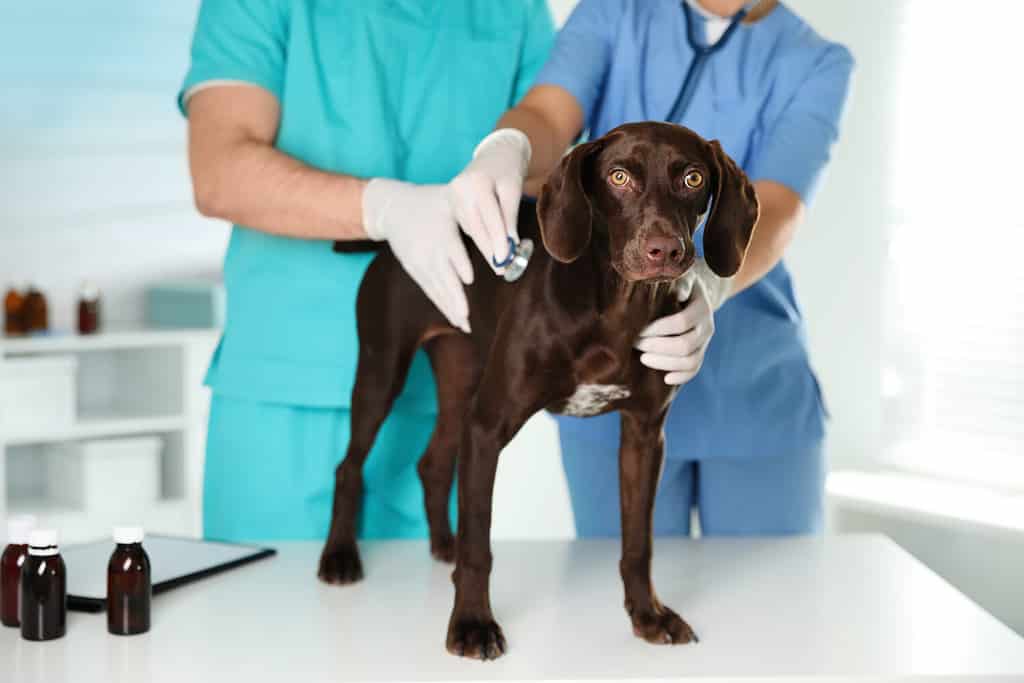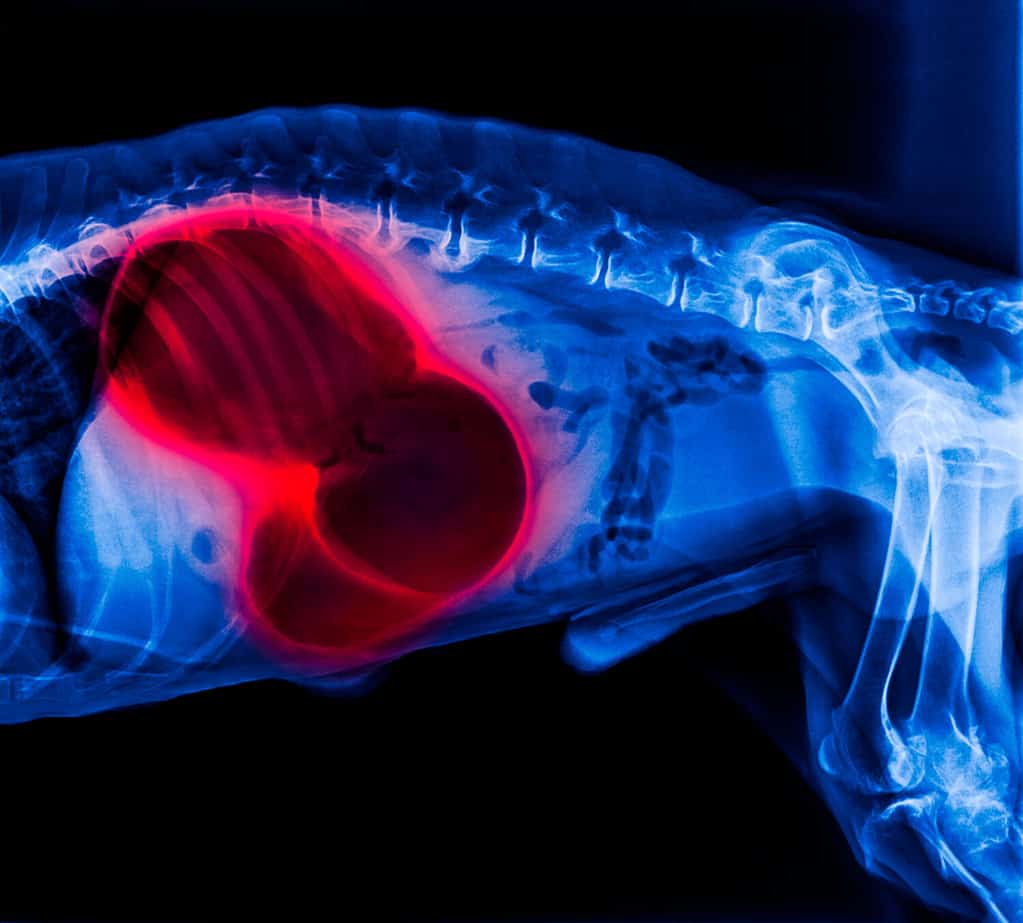Simethicone is an over-the-counter medication for bloating, burping, flatulence, and pain caused by intestinal gas in dogs or cats. It can be a safe and effective treatment for these common problems. Before treating your animal with any medication, knowing the risks, side effects, proper dosage, and other essential factors is important. This article provides basic information to help you speak knowledgeably with your veterinarian about your dog’s condition and medication.

Even though Simethicone is available over the counter, it’s best to consult your veterinarian first.
©New Africa/Shutterstock.com
Why Do Dogs Get Gas?

Feeding your dog pumpkin can be a natural way to help prevent gas.
©iStock.com/wavetop
Before discussing how to treat gas in dogs, it’s helpful to know what causes it so you can help prevent it. Some breeds are more subject to gas than others. Dogs with flat faces, like Pekingese, tend to ingest more air as they eat, which forms gastrointestinal gas bubbles. Gas can form from eating too quickly and ingesting gulps of air along with food. Dogs can get gassy with sudden changes to their diet, eating table scraps or garbage, or because something in their diet doesn’t agree with them.
One of the natural ways to prevent gas is to use a higher-quality dog food. One with probiotics or prebiotics will aid digestion. Pumpkin is a natural food that can help settle your dog’s digestion and balance the acidity in the stomach. Pumpkins should not comprise more than 10% of the animal’s diet. Training your dog to eat more slowly can also help.
What is Simethicone?
You might be familiar with Simethicone under brand names like Alka-Seltzer, Gas-X, Maalox, or Mylanta. These are marketed for humans suffering from intestinal gas. In both humans and animals, this medication doesn’t decrease gas production; it just prevents larger bubbles from forming. Smaller-sized bubbles are less painful and pass more easily through the gastrointestinal tract. The drug may be administered in tablets, chewables, liquids, or capsules.
Why Give Simethicone to a Dog?

Simethicone can help a dog suffering from gastrointestinal distress.
©Olya Maximenko/Shutterstock.com
A veterinarian might recommend Simethicone to treat bloating, flatulence and burping together with dietary changes. Another reason a dog might take Simethicone is to clear out bloating before getting an x-ray or gastrointestinal endoscopy to help the vet see the organs without distortion.
Risks and Side Effects of Simethicone

The red highlight in this x-ray indicates gastric dilatation volvulus and severe bloating twisting of the stomach.
©Intarapong/Shutterstock.com
It is not absorbed through the digestive system, so it is generally safe, has few side effects, and rarely results in overdoses. However, some dogs have drug allergies or hypersensitivities. Dogs can react to Simethicone with diarrhea, lethargy, nausea, and vomiting. Simethicone is often administered together with antibiotics but may interact with other drugs your dog is taking. Many vets consider this drug safe for a pregnant or lactating dog, but its safety has not been definitively established. Giving a dog unusually large dosages of Simethicone can produce loose stools.
Simethicone will not be enough for a dog suffering from a severe form of bloat called gastric dilatation-volvulus. Symptoms can include unsuccessful vomiting that brings nothing up or just foam or mucus. The dog may be anxious and restless, hunched, panting, breathing shallowly, and foaming at the mouth. The abdomen may or may not be visibly bloated, but if you put your ear to it, you will not hear normal digestion sounds. If you suspect your dog has bloat, give two doses of Simethicone immediately and call your vet immediately.
Dosage for Simethicone for Dogs

Consult your veterinarian for proper medicine dosages for your dog based on size.
©sirtravelalot/Shutterstock.com
Always consult your veterinarian for expert guidance on the correct medication dosage for your dog. As a general guideline, if you use a liquid that can be precisely measured, administer 1-2 mg per pound of body weight every six to 12 hours as needed. The chart below shows what that could look like for dogs of different weights.
| Dog’s Weight (Pounds) | Simethicone Dosage | Dog Breeds Include |
|---|---|---|
| 0 – 5 | 5-10 mg | Pomeranian and Chihuahua |
| 5 – 10 | 10-20 mg | Boston Terrier and Pekingese |
| 10 – 20 | 20-40 mg | West Highland Terrier and Pembroke Welsh Corgi |
| 20 – 30 | 40-60 mg | Beagle and Cardigan Welsh Corgi |
| 30 – 40 | 60-80 mg | Vizsla and Samoyed |
| 40 – 50 | 80-100 mg | Irish Setter and Airedale Terrier |
| 50 – 60 | 100-120 mg | Labrador and Golden Retrievers, and Staffordshire Terrier |
| 60 – 70 | 120-140 mg | Chow Chow, American Staffordshire Terrier, and Dalmatian |
| 70 – 80 | 140-160 mg | Cane Corso, Rottweiler and Akita |
| 80 – 90 | 160-180 mg | Chinook, Bloodhound, and German Shepherds |
| 90 – 100 + | 180-200 mg | Great Dane, Saint Bernard, and Bullmastiff |
Monitor your dog closely while taking any medication. Watch for adverse side effects or a worsening of the animal’s condition. Complete the entire medical treatment plan your vet gives, even if the dog seems completely better.
The photo featured at the top of this post is © Miroslava Levina/Shutterstock.com
Ready to discover the top 10 cutest dog breeds in the entire world?
How about the fastest dogs, the largest dogs and those that are -- quite frankly -- just the kindest dogs on the planet? Each day, AZ Animals sends out lists just like this to our thousands of email subscribers. And the best part? It's FREE. Join today by entering your email below.
Thank you for reading! Have some feedback for us? Contact the AZ Animals editorial team.







